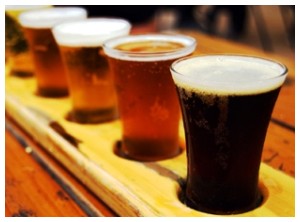Chilean Beer & Copa Cervezas de America

 Chile is a land of diversity. With a coastline that spans 2,653 miles, it caresses the South Pacific Ocean and stretches around Cape Horn to kiss a small part of the South Atlantic Ocean. To the north lies Peru and Bolivia, with Argentina to the east. The landscape blends from desert-like to volcanic to tundra and glacial, and spans at least seven major climates. My own introduction to this land to the south was through Bruce Chatwin's book, In Patagonia, an exhilarating and exotic travelogue from 1977, recommended to my by Beer Hunter Michael Jackson.
Chile is a land of diversity. With a coastline that spans 2,653 miles, it caresses the South Pacific Ocean and stretches around Cape Horn to kiss a small part of the South Atlantic Ocean. To the north lies Peru and Bolivia, with Argentina to the east. The landscape blends from desert-like to volcanic to tundra and glacial, and spans at least seven major climates. My own introduction to this land to the south was through Bruce Chatwin's book, In Patagonia, an exhilarating and exotic travelogue from 1977, recommended to my by Beer Hunter Michael Jackson.
One would expect beer to be as variable as the terrior. As in any civilized nation, big beer companies command huge market share. CCU, Compania Cervecerias Unidas SA, holds 88% of market share in Chile, along with strong operations in Argentina, the Cayman Islands and Liechtenstein. Cristal is CCU’s mega brand in Chile, one that dominates with 62% of the market, along with Royal Guard, Royal Light, Heineken, Budweiser, Paulaner, Austral and Kunstmann, which they produce under license.
Santiago de Chile is the capital and largest city in Chile, affectionately called the Switzerland of South America. Its economy is strong, with a middle class that is growing in strength due to a high level of education, multiple universities, a safe juridicial system, and robust purchasing power that is coupled to the Unidad de Fomento (a system that adjusts for inflation so values remain constant).
This translates to huge opportunity for craft brewers. International investors view Chile as a sweet spot for growth, and the craft brewers in Chile are spreading their wings to expand the breadth of style available to consumers. The South American craft beer market is in its early developmental stages, being led by a handful of brewers that have the passion, zeal and vision to make it happen. Chile and Argentina are showing strength, but are looking for the guidance of global competitors to raise the quality of their available beers. They recognize their own potential for growth, and are eager to educate the palates of their patrons, while expanding growth throughout the craft beer market.
Copa Cervezas de America, Chile’s first national craft beer competition, is set for September 2011, and will showcase the diversity of all craft beer produced or sold in South America. Organizers include Daniel Trivelli, Sales Manager - USA, Middle East & Africa for Maltexco, assisted by Asbjorn Gerlach, Brewmaster of Cervecería Kross, who is helping to find judges, globally, to provide credibility and a serious tone to the competition. They wish to develop this competition into one that will set the bar for all South American Craft Beer producers.
They are planning two separate segments of the competition, with Chilean breweries competing in both:
- The first one will encompass only Chilean craft beer producers.
- The second one will be open to all Latin American countries. Copa Cervezas de America will include two days of competition and two days of conferences that will include a round table of Master Brewers, a conference highlighting the judge’s expertise, and other seminars beneficial to the craft brewers of Chile. Judges from outside the region may be escorted on a visit to Valdivia, one of the main brewery regions in Chile, as well as a visit to brewery sites around Santiago.
Copa Cervezas de America will include two days of competition and two days of conferences that will include a round table of Master Brewers, a conference highlighting the judge’s expertise, and other seminars beneficial to the craft brewers of Chile. Judges from outside the region may be escorted on a visit to Valdivia, one of the main brewery regions in Chile, as well as a visit to brewery sites around Santiago.
Daniel Trivelli provided me with an overview of some of the craft brewers in Chile. The two most recognized of these may be categorized as Regional Craft Breweries: Cerveceria Austral and Cerveceria Kunstmann. They are owned, at least in part, by CCU, but are generally viewed as having an independent line of beers.
There are also independent craft breweries with wider recognition that are more available in grocery stores. These include: Kross, Szot, Capital, Del Puerto, Valbier, Grassau, Volcanes del Sur, Edelstof, and Colones. Szot of San Bernardo has won numerous medals in the Australian International Beer Awards, and has earned recognition for the Best Ale in Chile at La Cav in 2008. Szot produces styles that include Steam Beer, Barleywine-style, and a Strong Ale, matured in oak.
In addition to these larger microbrewers is a list of smaller artisan breweries. Many commonly serve a light or amber lager, golden ale and dark ale. They may also have a porter or stout. A few stand-outs also make Weissbier, honey ale, Scottish ale, or bock.
The list of small brewing companies includes: Toto Paire, Crater, Armin,Salzburg, Calle Calle, Cuello Negro, Km 858, Black Ice, Monte Verde, D’olbeck, König, Bigas, Quimera, Leyenda, Cuadillo, De autor, Mestra, Diem, Turbinger, Troya, Iquiqueña, Mahina (Easter Island), Cerro Alegre, Kivas, Cruzana, and Berner.
Pascual Ibañez, a beer sommelier in Chile, has published Guia de la Cerveza en Chile 2011, a guide book to the beers in Chile, and includes his opinions and comments in this compendium of Chilean beer.
Like horses at the starting gate in the Kentucky Derby, Chilean Brewers are ready to expand into the global market. With the organization of these small, independent brewers into an association that can recognize and define the broad spectrum of styles available across the world, they have the ability to emerge as a key player in the beer community. The USA has a strong Latino population, one that may be eager to enjoy imports of Latin origins. Chile may be the next big import market.
Cheers!
In Patagonia (Penguin Classics) - Bruce Chatwin's adventure travelogue - a peek at Patagonia through the eyes of a 1970s journalist
Culture and Customs of Chile (Culture and Customs of Latin America and the Caribbean) - Chile, a country of diversity!
You Should Also Read:
Beer in South America - Homebrewers of Argentina
What is an American Craft Brewer ?
What is a Cicerone ?

Related Articles
Editor's Picks Articles
Top Ten Articles
Previous Features
Site Map
Content copyright © 2023 by Carolyn Smagalski. All rights reserved.
This content was written by Carolyn Smagalski. If you wish to use this content in any manner, you need written permission. Contact Carolyn Smagalski for details.



